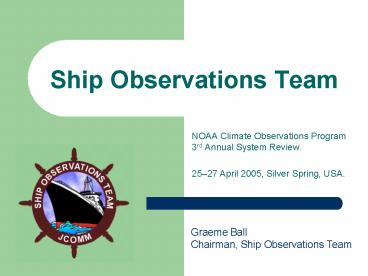Ship Observations Team - PowerPoint PPT Presentation
1 / 22
Title:
Ship Observations Team
Description:
Ship Observations Team NOAA Climate Observations Program 3rd Annual System Review. 25 27 April 2005, Silver Spring, USA. Graeme Ball Chairman, Ship Observations Team – PowerPoint PPT presentation
Number of Views:110
Avg rating:3.0/5.0
Title: Ship Observations Team
1
Ship Observations Team
- NOAA Climate Observations Program 3rd Annual
System Review. - 2527 April 2005, Silver Spring, USA.
Graeme Ball Chairman, Ship Observations Team
2
Outline
- JCOMM
- Background.
- Structure.
- SOT
- Composition of SOT.
- Program Status.
- Objectives of SOT.
- Scientific Guidance to SOT.
- SOT Working Arrangements.
- Panel Chairs.
- SOT Sessions.
- Achievements.
- Major Issues from SOT-III.
- Websites.
3
JCOMM Background
- The reporting and coordinating mechanism for all
operational marine activities of both WMO and
IOC. - Formally established in 1999 through a merger of
- WMO Commission for Marine Meteorology (CMM).
- IOC Committee for the Integrated Global Ocean
Services System (IGOSS).
Joint Technical Commission for Oceanography and
Marine Meteorology
4
JCOMM Structure
5
Composition of SOT
- SOT consists of a group of enduring and
successful data collection programs - Voluntary Observing Ships (VOS) Scheme.
- Ship of Opportunity Programme (SOOP).
- Automated Shipboard Aerological Programme (ASAP).
- Membership is open to any country operating any
of these programs.
6
Program Status
- VOS
- About 6,700 ships worldwide taking surface
meteorological observations (1,080,000 SHIP
messages on GTS in 2003). - SOOP
- About 70 ships worldwide taking upper-ocean
thermal profiles on prescribed XBT sampling lines
( 24000 BATHY p.a.). - ASAP
- About 15 ships, mostly in the North Atlantic and
Mediterranean, taking upper-air profiles (4000
TEMP in 2004).
7
XBT Sampling Lines
8
ASAP routes (2004) for EUCOS
9
Sub-Programs/Projects
- VOSClim VOS Climate Project
- Reference climate network (target 200 ships,
now 55). - Multi-disciplinary underway sampling
- Including atmospheric and ocean carbon,
fluorescence, pigments, SST and salinity (few
ships). - WRAP Worldwide Recurring ASAP Project
- Upper-air profiles in the Indian Ocean (1 ship).
10
Objectives of SOT
- To manage, coordinate and, wherever possible,
integrate these programs to support a range of
well defined operational and research
applications. - To liaise and coordinate with other groups
involved in using volunteer ships as
environmental observing platforms with a view to
their participation in SOT. - To foster greater national coordination between
agencies involved in similar or related programs.
11
Scientific Guidance to SOT
- Provided by panels and bodies for climate and
operational meteorology, including - GCOS/GOOS/WCRP Ocean Observations Panel for
Climatology (OOPC). - CLIVAR Global Synthesis and Observations Panel
(GSOP). - WMO Commission for Basic Systems (CBS).
12
SOT Working Arrangements
- SOT meets every two years.
- Incorporates separate but plenary sessions of the
three program panels. - Matters of general interest are discussed during
the common sessions of SOT. Panel specific
matters are discussed during the plenary sessions.
13
SOT Working Arrangements
- Most work is undertaken during the
inter-sessional period by specific Task Teams
that report to SOT - VOS Recruitment and Programme Promotion (SOT-II).
- Metadata for Pub47 (SOT-II).
- Satellite Telecommunications Costs (SOT-II).
- Instrument Standards (SOT-II).
- VOSClim (SOT-III), replaces the former VOSClim
panel. - Coding (SOT-III).
14
Panel Chairs
SOT Graeme Ball Australia
VOSP Julie Fletcher New Zealand
SOOPIP Steve Cook United States
ASAPP Sarah North United Kingdom
caretaker role until JCOMM-II
15
Sessions of SOT
SOT Date Date Location Plenary Sessions
1 Mar 2001 Goa, India. VOSP-II, SOOPIP-IV, ASAPP-XIII
2 July 2003 London, UK. VOSP-III, SOOPIP-V, ASAPP-XIV
2 Held in conjunction with PMO-II and VOSClim-IV Held in conjunction with PMO-II and VOSClim-IV Held in conjunction with PMO-II and VOSClim-IV
3 Mar 2005 Brest, France. VOSP-IV, VOSClim-V, SOOPIP-VI, ASAPP-XV.
16
Achievements
- Greater cooperation and coordination between
- VOSP, SOOPIP and ASAPP.
- International VOS, SOOP and ASAP operators.
- National agencies operating similar programs.
- Greater drifting buoy and profiling float
deployment opportunities to support - DBCP and its Regional Action Groups.
- AST.
17
Achievements
- Greater liaison with other groups that use
volunteer ships as observing platforms - International Ocean Carbon Coordination Project
(IOCCP). - Seakeepers International.
- Greater use of PMOs, leading to a reduced number
of visitors to ships with sampling program
requests. - Spreading the load - ensuring the better
reporting and more obliging ships are not
over-tasked.
18
Achievements
- Raising awareness of the need for
- Comprehensive observer training and re-training.
- Equipment standards leading to data quality
assurance. - Regular instrument calibration checks or
replacement. - Robust data processing and reporting methods.
- Data quality control and quality monitoring.
- JCOMMOPS support
- Currently provided to DBCP, SOOP and Argo.
- Increasing for the VOS (and possibly also for
ASAP).
19
Achievements
- Enhanced VOS monitoring tools
- Timeliness of receipt of observations.
- Multi-recruitment.
- Data quality monitoring.
- Integration opportunities provided by the Task
Team on VOS Recruitment and Programme Promotion - Design Guidelines for shipbuilders.
- SOT Certificate of Participation.
- SOT flyer.
- PowerPoint presentation on ship recruitment.
20
Major Issues from SOT-III
- Security issues resulting from the
publishing/plotting of ships names and positions
on the Internet. - Impact of the ISPS Code and Customs requirements
on national VOS operations. - Promotion of the VOS Scheme through IMO.
- Multi-recruitment of VOS ships.
21
Websites
JCOMM www.wmo.ch/web/aom/marprog/
SOT www.jcommops.org/sot/
VOS www.bom.gov.au/jcomm/vos/
SOOP www.ifremer.fr/ird/soopip/
JCOMMOPS www.jcommops.org
22
(No Transcript)































